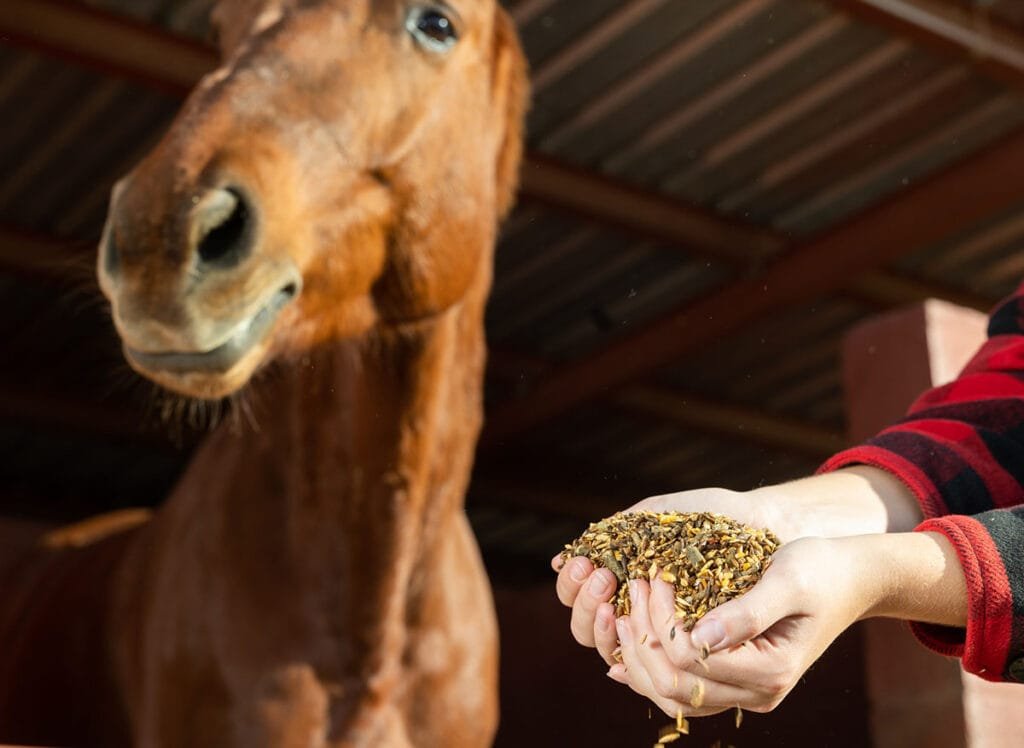Proper nutrition is fundamental to a horse’s health, performance, and overall well-being.
Just like humans and other animals, horses rely on a balanced diet to meet their physical, metabolic, and behavioral needs. Without the right balance of nutrients, horses can experience a wide range of health issues, some of which can be severe or even life-threatening. In this article, we’ll discuss the impact of poor nutrition on horse health, the common signs of malnutrition, and how to prevent and address nutritional deficiencies.
Understanding Horse Nutrition
Horses are herbivores, and their diet should primarily consist of high-quality forage such as grass and hay. Forage provides fiber, which is essential for digestion and maintaining gut health. Alongside forage, horses may require concentrated feeds like grains or specially formulated pellets to meet their calorie needs, especially for performance horses, pregnant mares, or horses with special health conditions.
Key nutrients that horses need for optimal health include:
- Fiber: For digestive health and normal gut function.
- Protein: For muscle maintenance, growth, and repair.
- Carbohydrates: For energy, especially in active horses.
- Vitamins and minerals: For bone health, immune function, and overall well-being.
- Water: Essential for digestion, circulation, and maintaining body temperature.
When any of these nutrients are lacking or imbalanced, the impact on the horse’s health can be significant.
Common Signs of Poor Nutrition
Poor nutrition can manifest in a variety of ways, depending on which nutrients are deficient. Some common signs of malnutrition in horses include:
- Weight loss or weight gain: Horses that are not receiving enough calories may lose weight or become lethargic. Conversely, horses overfed with grains or sugary treats may become obese.
- Poor coat condition: A dull or flaky coat can indicate a lack of essential fatty acids, protein, or vitamins.
- Behavioral changes: Horses that are underfed or lacking certain nutrients may become irritable, lethargic, or excessively hungry. This can also result in bad behavior like cribbing or chewing on wood.
- Digestive issues: Horses with insufficient fiber intake may experience colic, diarrhea, or constipation.
- Muscle weakness or atrophy: Protein deficiencies or an inadequate diet for an active horse can result in muscle wasting or weakness.
- Hoof problems: Poor nutrition can lead to brittle hooves, cracks, or infections. Horses lacking important minerals like biotin or zinc may experience compromised hoof health.
- Frequent illness or poor immunity: A weakened immune system due to inadequate vitamins and minerals can make a horse more susceptible to infections, illnesses, and poor recovery from injury or stress.
Specific Health Issues Linked to Poor Nutrition
- Colic: Colic, or abdominal pain, is one of the most common and serious digestive problems in horses. It can result from an improper diet, including sudden changes in feed, inadequate fiber, or overfeeding concentrates (grains or pellets). A lack of fiber can cause the digestive tract to slow down, leading to impaction colic, which can be life-threatening without treatment.
- Laminitis (Founder): Laminitis is a painful condition that affects the horse’s hooves, often triggered by a high-carbohydrate diet (such as too much grain or lush pasture). Overfeeding sugar-rich foods can cause inflammation in the hoof’s sensitive laminae, leading to lameness or even permanent damage to the hooves.
- Obesity: Overfeeding high-calorie feeds, especially grains and treats, can lead to obesity. An overweight horse is at risk for a range of health problems, including laminitis, insulin resistance, and joint issues. Obesity can also limit the horse’s ability to perform, causing strain on the body.
- Nutritional Deficiencies: A horse that doesn’t receive enough of the essential vitamins and minerals can suffer from a variety of health issues:
- Vitamin E and Selenium Deficiency: Can cause muscle weakness and a condition known as “tying-up” or “azoturia.”
- Calcium and Phosphorus Imbalance: Can lead to skeletal problems, including osteoarthritis or poor bone development.
- Iron Deficiency: Can cause anemia, resulting in fatigue, weakness, and poor performance.
- Magnesium Deficiency: May lead to muscle spasms or other metabolic issues.
- Reproductive Issues: A mare that is undernourished may have difficulty conceiving or carrying a pregnancy to term. A proper balance of protein, vitamins, and minerals is critical during pregnancy and lactation to ensure the health of both the mare and the foal.
Preventing Poor Nutrition in Horses
To prevent poor nutrition and the associated health problems, it is essential to provide your horse with a balanced and appropriate diet tailored to its specific needs. Here are some steps to take:
- Choose high-quality forage: Always ensure your horse has access to fresh, clean hay or pasture that is free from mold, dust, and contaminants.
- Monitor body condition: Keep track of your horse’s weight and body condition using a body condition scoring system. Adjust their diet if they are too thin or overweight.
- Consult with a veterinarian: Regular check-ups with a veterinarian or equine nutritionist can help identify nutritional deficiencies early. They can guide you in choosing the best feed and supplements for your horse’s needs.
- Avoid sudden diet changes: When changing your horse’s feed, introduce new foods gradually to prevent digestive upset.
- Provide fresh water: Always ensure your horse has access to clean, fresh water. Dehydration can lead to digestive issues, kidney problems, and overall weakness.




